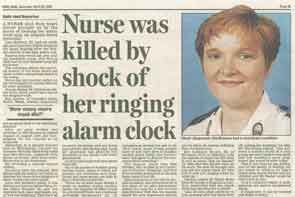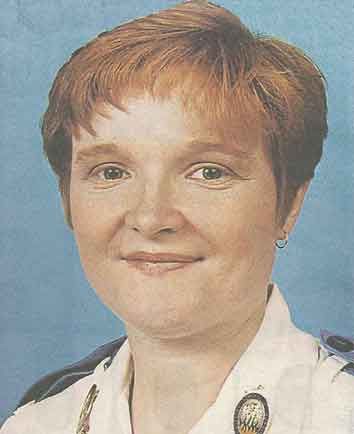A nurse died from heart failure brought on by the shock of hearing her alarm clock ring, an inquest heard yesterday.
Lisa Browne, 27, had an undiagnosed disorder which stopped her heart beating after the sudden shock of her 6am alarm call.
Experts discovered last year that the paediatric nurse, who died in 1998, had the rare disorder Long QT Syndrome.
The condition affects the electrical system of the heart which can cause sudden unexplained death in the young.
Yesterday her mother called on the Government to screen children for heart problems.
Doreen Harley, 58, believes an earlier ECG check could have saved her daughter's life.
Mrs Harley, of Connah's Quay, North Wales, always suspected her daughter died of the hereditary disorder.
After an open verdict was recorded at Mrs Browne's original inquest in August 1998, she campaigned for the inquest to be reopened,
Yesterday, at a second inquest held in Warrington, coroner for Cheshire Nicholas Reheinberg ruled that Mrs Browne, originally from Stoke-on-Trent, died from heart failure due to the syndrome.
He recorded a natural causes verdict.
Speaking after the inquest, Mrs Harley said she hoped the battle to discover the cause of her daughter's death would help save others.
After Mrs Browne's death, it was discovered that her father Terry, 61, her sister Rachel, 33, and her nephews Jack, nine and Adam, six, all had the syndrome. They have all received treatment and are living normal lives.
Mrs Harley said: "Long QT Syndrome has affected five members of our family over three generations.
An ECG test could well have saved Lisa's life.
"All of the causes of sudden young cardiac death, many of which are genetic, are treatable once diagnosed and most people are able to live a relatively normal life.
"There are at least eight deaths a week to sudden young cardiac death, the majority of which could be prevented if there was a national screening programme for all teenagers at around the age of 14.
"How many more young people have to lose their lives to sudden cardiac death before the Government will agree to finance the necessary ECG screening?"
The inquest heard that Mrs Browne, who worked at the Countess of Chester Hospital, suffered from extreme exhaustion in the lat three years of her life.
She complained to her GP on several occasions, who prescribed her a low dose of an anti-depressant which she took for a few months from October 1996. But the inquest heard the anti-depressant should not be taken by anyone suffering from the syndrome.
Her husband Stuart, 38, of Ellesmere Port in Cheshire, told the inquest he found his wife dead in bed at about 7am on January 10, 1998 after she did not wake up for work. He said he thought she had set her alarm clock for 6am but it was not ringing when he woke up.
Cardiac expert Dr Elijah Behr, from St George's Hospital in London, concluded that the alarm clock had shocked her to death.
"Lisa Browne died suddenly in bed, probably after her alarm went off, waking her suddenly," he said.
Mr Rheinberg added: "Lisa suffered a sudden death at a very young age and I think it very likely had her condition been diagnosed, she would be alive today.
"Had it not been for the dedication of her family in finding out the cause in relation to Lisa's death, then clearly Rachel and her children and Mr Harley would be very much at risk.
"It is a condition which, if undiagnosed, can lead to unexplained death.
If diagnosed, it can be treated and death avoided.







